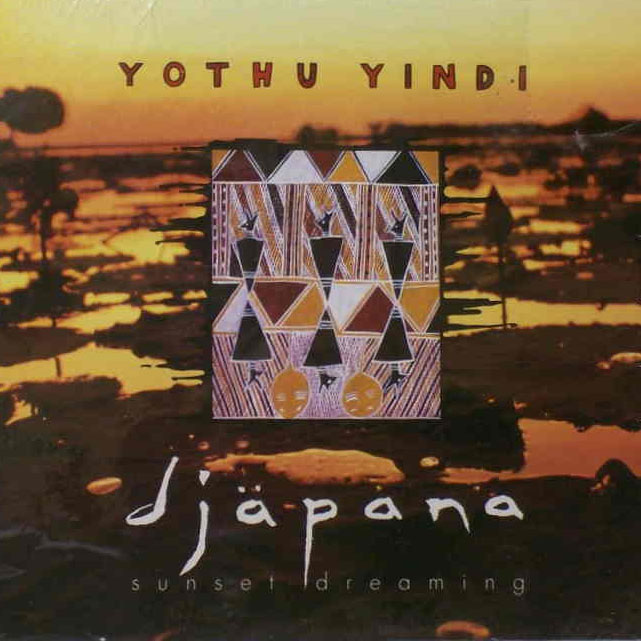Day 87: A song that you like that’s from a different culture.
“Djäpana” – Yothu Yindi
 Today’s choice may be a little sketchy, depending on your interpretation of the challenge.
Today’s choice may be a little sketchy, depending on your interpretation of the challenge.
“Djäpana” is a song by Yothu Yindi, a group composed of both Australian Aboriginals and non-Aboriginal members. The music has a western sound, but it is strongly influenced by the Aboriginal culture and makes good use of native instruments, such as yidaki (more commonly known as the didgeridoo). The video for the song also embraces and celebrates the Aboriginal culture.
When I returned to Australia in 1992, the group had recently released its Tribal Voice album, which spawned not only “Djäpana” but also another hit called “Treaty.” And both were doing well in the ARIA charts.
Not familiar with a song I’ve mentioned?
Click ![]() above to hear samples
above to hear samples
and purchase songs.
This was a little surprising to me, because at the time, racism was still pretty rampant in Australia. (That’s not to say it isn’t here in the US, too, but I saw more blatant evidence of it there than I had ever witnessed personally here.) Hopefully that’s changed in the intervening two decades, but I can’t say for sure. In fact, some of the lyrics in “Djäpana” deal with that, as well:
Out there
How come
You ain’t fair
To the people
Of the land
Try my, try my, sunset dreaming
Now, to be sure, it’s not all Australians who held those views. Bands like Midnight Oil (and others) were doing what they could to not only change the “mainstream view” of the Aboriginals, but also to work towards Aboriginal rights. I think they were attempting to bridge the gap, to varying degrees of success. (Some people will never change their minds.) Songs like “The Dead Heart” and “Warakurna” are in the vein of trying to get people on each side of the race line to understand each other (and their issues) better. Here’s hoping…
On a less serious note, “Djäpana” could have been a serious contender for the “song you change the words to when you sing it” post. I’ve been singing the native lyrics wrong for so many years, I couldn’t even begin to get them right at this point. For example, the song starts with (and it might be helpful to start the video now and listen as you read):
Wo-o-o warwu
Now, I stayed in a small town called Kiama, and there was a nearby town called Warrawong. The way “warwu” from the lyric above is sung, it always sounded like “Warrawong” to me (even though I knew it wasn’t) so that’s what I sang.
For mis-sung lyric #2, direct your attention to about 0:15 in the video. Tell me it doesn’t sound like they’re chanting “puffed wheat” (or “buckwheat”, take your pick, although given the stereotype usually associated with that it could be considered a little bit racist in itself). I honestly have no idea what they’re actually saying. So, “puffed wheat” it is.
Note the didgeridoo in that passage as well.
Hmm? Why, yes, I am trying to draw your attention away from my idiocy, in fact. Did it work?
But back to the matter at hand. No, “Djäpana” is not a “pure” example of a song from another culture. It’s not really “World Music” as we’ve come to know it. I suppose I could have gone with something from Paul Simon or Peter Gabriel, but I don’t feel like that counts since it’s coming primarily from a very “Anglo” artist, even if there are World Music elements to it. My choice is not something from Africa or South America, but the Aboriginals have their own unique culture. One that should be respected and celebrated. Despite its Western leanings, “Djäpana” is about as close as I can come using songs that are actually in my collection.
And at the end of the day, I just like it.
Sunset dreaming…